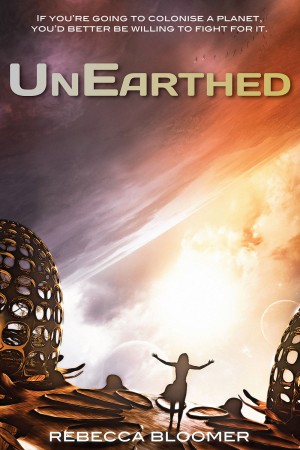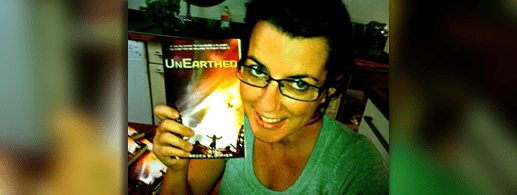What have you been up to since UnEarthed? We haven’t heard any whispers of secret Mars colonisations…
Earthly life has been a bit hectic. I’m studying horticulture, which I recently managed to link to my space addiction by doing a presentation on vertical gardens. These could well be the best gardens for space (maximum production using minimal space, I thought it was a great link!). I’m also very down to earth at the moment in that I’ve started my own little ‘homestead’ (can’t really call it a farm because it’s not producing anything for anyone else) and am keeping some pigs, chickens, ducks and children happy, all while attempting to grow a ‘food forest… I may have more chance of making it into space!
Creating a new city on a largely unexplored planet requires a lot of creativity and world-building. What were some of your inspirations in creating Anphobos?
I used to work in the journalism department of the University of Queensland. During that time I did some research into how pop culture influences the ideas of engineers when they undertake the NASA Ames Space Settlement Competition (yup, it does exist). It was all a lot of number crunching and data analysis, so naturally when my mind needed a little break, I would wander to Anphobos!
UnEarthed and UnEarthly (damn, is that a spoiler?) are actually my only books for which I have books and books of research, notes and drawings. I like my science fiction to have actual science in it!

Mars has been a popular destination for those seeking to set their stories on another planet, most notably with the film and novel The Martian. Tell us what attracted you to the Red Planet for UnEarthed?
I love the mythology surrounding Mars. I mean, even the names of the moons, Deimos and Phobos are just too cool to be ignored. Also, I’m an Aries girl. If you know anything about astrology, that means I’m ‘ruled’ by Mars. All that great mythology and superstition, in combination with some science (sponsored by NASA), puts Mars way ahead in the ‘Where will I set my space novel’ competition.
Jodi, like many Young Adult novel protagonists, quickly becomes embroiled in the divisive politics of her new home. Why do you think it’s important that young people be included in political discussion?
As a former high school teacher, I still hold to the belief that children (and teens) are quite literally our future. The decisions we make today will affect them just as much (if not more than) than they affect our own.
Often I think kids are better at discussions about the future because they are less bound to the past. As residents of the future, teens should be involved in discussions and decisions revolving around how they want to experience that future.
One important point in UnEarthed is the separation between Earthlings and those born on Mars. Did you feel another planet was a more delicate environment in which to tackle the idea of racism?
I grew up in a family that often struggled to keep food on the table and because my dad followed work around the country, my brothers and I were always the new kids at school. Being both poor and new, we were regularly the brunt of other people’s elitist, close-minded or snobby attitudes. These attitudes are the distant (and diluted) cousins of those which generate racism.
In writing UnEarthed, I wanted to point to the fact that intelligent people can be racist too, and that bigotry of any kind creates an ugliness that most people would rather not see in any community, much less in the mirror.
How do you balance the need to make your characters relatable, while also making them interesting enough to drive the plot?
Mmmm…some reviewers will tell you that I don’t do this well at all. As sci-fi is generally plot-driven, I try hard not to get bogged down in character building. With UnEarthed, I wanted it to read sort of like a Marvel comic or a film script. Once the characters are built, there’s no need to keep harping on.
One of the best things I’ve learned about writing is ‘thoughts into actions, ideas into objects’. This is what editors mean when they say ‘show don’t tell’. A character’s thoughts should be evident because they DO something to demonstrate their thoughts or feelings. Their beliefs and ideas will be reflected in the things with which they surround themselves.
For example, Astrid wears her high-tech suit and has her nanotats because she and her family value cutting-edge science. To them it’s something accessible, wearable and mundane as well as something to engage their minds as they explore it further. Jodi on the other hand, is still sort of clinging to home; that’s why she wears her white, Anphobosite pyjamas instead of a suit like Astrid’s.
Teenagers can be a notoriously picky audience, and are often difficult to engage. What makes you want to write for them?
Ha! I’m a sucker for punishment! No, really… Before I wrote YA, I had a fair bit of success as a romance writer. Romance is quite a ‘strict’ genre and women are a tough audience; if they don’t like your characters, the romance doesn’t work. Characters need to be real enough to be relatable and ‘unreal’ enough that they offer a glimpse into another life, and that’s a tough gig.
Teens are only tough if you try talking down to them. I used to tell my student teachers that students could spot BS at fifty feet, so you’d better be real with them. I think I’m pretty real, so when I say that I truly do believe that teens are the only future we have… why wouldn’t I want to write for them?
In spite of that, the Young Adult genre has grown in popularity in recent years. Why do you think this is?
There are two answers to this. One is glib and the other is boring and technical.
The glib version: JK Rowling and John Marsden.
The boring version: YA is a big tag that covers a huge demographic. There are still debates as to what constitutes YA. Is it books that engage young adults or books with Young Adults as the protagonists? The Book Thief was marketed as YA in the U.S. Truth be told, I sobbed my way through the last half of that book but I don’t think it would have had the same effect on my teenaged daughter.
As you pointed out, there’s a distinct challenge involved in writing a good YA novel. YA readers won’t tolerate a lot of the rubbish that older readers will. As a consequence the calibre of writing within the YA field is generally very high. Great books equal increased readership.
You took a break from writing over the past couple of years. What was it that drew you back?
Even though I was crazy busy, I felt kind of ‘dry’ and two-dimensional when I wasn’t writing. Even now, when I’m not physically writing, I still have the chance to dream up more of a plot or a play with an idea that might become a plot or a character. That daydreaming gives texture and colour to my life and I’ve begun to realise that I need that to be happy.
We hear you’ve got something new on the cards. Any teasers?
There are a couple of things on the go at the moment, but I think the one closest to fruition is my attempt to answer many of the questions that UnEarthed raised. In answering those questions I’ve also had the chance to write my first gay kiss and pansexual character. I think it’s a beautiful moment ☺
